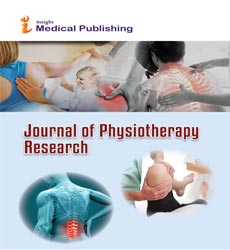Editorial Note on Children Physiotherapy
Paula Maria Martini*
Department of Physiotherapy, University of Guanajuato, Mexico, North America
- *Corresponding Author:
- Paula Maria Martini
Department of Physiotherapy
University of Guanajuato, Mexico, North America
E-mail: malarvizh23@gmail.com
Received Date: November 08, 2021; Accepted Date: November 13, 2021; Published Date: November 18, 2021
Citation: Martini PM (2021) Editorial Note on Children Physiotherapy. J Physiother Res Vol.5 No.11:51.
What role may parents play in their children's lives?
In physical therapy, parents and caregivers can be quite involved. They are frequently present in the therapy session with the kid and frequently communicate with the therapist about how the child is doing at home and at school, as well as any changes.
Some physical therapy programmes include a component that parents and caregivers can use at home. If this is the case, the caregiver will be given detailed instructions for each exercise and may be allowed to videotape the therapist working with the kid. Having this as a reference for their own learning aids in the caregiver's use of the home programme.
What role does physiotherapy play at LifeWorks?
LifeWorks' Children's Support is family-centered and interdisciplinary. This means we always begin by asking, "What will work for this child?" and "What is best for the family?" If physiotherapy is found to be beneficial, a treatment plan will be proposed by the physiotherapist.
However, we don't just consider physiotherapy; we consider a combination of therapies that will benefit the youngster. The therapists in the LifeWorks approach are not merely housed together; they plan, train, and work on a client file together. It's a holistic approach to assisting the family.
Physical therapists may have further training in certain modalities, such as:
• Kinesiotaping and other taping procedures
• Cuveas Medek exercises
• Treatment for Neuro-Developmental Disorders (NDT)
• Children's strength training
Children with neurological and developmental disabilities, as well as sensory impairments linked to hearing and vision, can benefit from early intervention from a paediatric physiotherapist. Children with biomechanical, postural, and sporting injuries can benefit from physiotherapy. Some children may have a variety of problems that a Paediatric Physiotherapist can help with.
The following are some instances of common parental concerns:
• Premature newborns (36 weeks gestational age) or babies with a low birth weight (1500 g)
• Newborn babies who have trouble turning their heads
• Newborn babies who refuse to do tummy time • Babies with flat areas on the back or side of their heads, particularly after the age of seven weeks
• Babies who have trouble rolling, sitting, crawling, or walking
• Pigeon toes, bow legs, in-rolling ankles, and knock knees in toddlers.
• Children who struggle with coordination, balancing, walking, or running.
• Frequent falls, a lack of balance, and a lack of coordination • Any child or adolescent who has sustained a sports-related injury
• Children with bad posture or who complain of muscle soreness on a regular basis
Paediatric physiotherapists assist youngsters in reaching their full physical potential. They are experts in the mobility, development, and conditions that are likely to impact a baby or growing child, and they treat infants as young as one day old up to adolescents. Soft tissue massage, mobilization, stretching, specific therapeutic exercises, and posture teaching may be used in the treatment. Because children are not miniature adults, these therapists inspire them to reach their full potential via play, age-appropriate pleasure, and teaching.
Open Access Journals
- Aquaculture & Veterinary Science
- Chemistry & Chemical Sciences
- Clinical Sciences
- Engineering
- General Science
- Genetics & Molecular Biology
- Health Care & Nursing
- Immunology & Microbiology
- Materials Science
- Mathematics & Physics
- Medical Sciences
- Neurology & Psychiatry
- Oncology & Cancer Science
- Pharmaceutical Sciences
